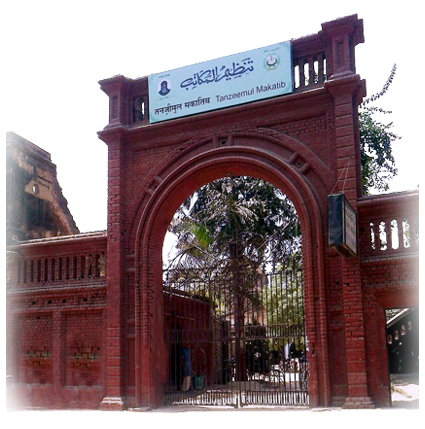ABOUT ORGANIZATION
Tanzeemul Makatib
ABOUT TANZEEMUL MAKATIB
Tanzeemul Makatib was established in1968 with the aim of ‘upliftment & development’ of the depressed class within society, especially the Indian Shia Muslim community by propagating education, guidance, awareness and training. Since its establishment, Tanzeemul Makatib has been continuously dedicated towards providing education, raising social awareness, offering social counseling, training, publishing & distributing text books & other teaching aids etc to the community. The organization’s main motive is to shape the child into a responsible and educated citizen who can contribute to society and nation.
Tanzeemul Makatib delivers a wide range of services. Multiple departments and associated groups are managing these services in a structured organizational hierarchy.

Organization Philosophy
We believe there are three stages of learning that every individual goes through in their life:
1) Home
2) School
3) Society (Surrounding Social Environment)
It is at these three stages where a person’s character and personality take shape. By providing guidance at these three stages, we can inculcate good moral values in to a person’s character. Since morality is the very essence of religion, learning religious values can help a person guard against evil and misdeeds.
Just like every religion, Islam too focuses on inculcating moral values within a person by establishing a clear set of guidelines with dos and don’ts, thereby, making it easier for the youth to walk on the path of righteousness and spread Islam’s message of peace and prosperity.
The Shia Muslim school of thought is based on the teachings of the Quran & the Prophet Muhammad.
In India, the Shia community was going through a rough patch, becoming lost and ignorant about Islam. The only education being imparted to them was Western education, which was leading them further away from religion.
There were only a handful of Arabic schools in the country. The ulema who had obtained education in these madaris under troublesome circumstances considered their future to be dark. They had limited their involvement with the community except for conducting Nikah, funeral prayers, Nazar, Fateha etc. “Amr-bil-Maroof’’and“Nahi-Anil-Munkar”, which are like the branches of the tree of Islam were considered as overstepping the limit. There were only a few ulemas who practiced these and the momineen in many areas had to solely rely on Tohfatul Awam. This state of affairs continued exists for long. Then in an unfortunate turn of events, the country was divided and as a result, majority of ulemas migrated from India to Pakistan. The businessmen and intellectuals thus became victims of confusion, fear and uncertainty. To make matters worse, practising religion was treated as crime.
Keeping no connection with religion was not just rampant in politics but had become a fashion. The last nail in the coffin was the sudden abrogation of the zamindari system, which led the community into an unprecedented poverty.
This marked the turning point in history when the founder of the Tanzeemul Makatib, Khateeb-e-Azam Late Moulana Syed Ghulam Askari (PBUH) stepped forward and began an Islamic knowledge revival in the country. He devoted all his time and energy towards the service of the community by providing quality education for children. Initially, he started this work alone and opened sixty schools in various settlements of momineen. Due to the lack of proper infrastructure and management, many schools had to be shutdown. Finally, he decided to launch a pan India movement. The makatibs (schools) all around the country were organized and the Momineen who were scattered all over
The came under the banner of one institution –Tanzeemul Makatib. This movement became a religious movement (Tahreek-e-Deendari).By the Grace of Allah, it has now spread not just all over the country, but in many other parts of the world.